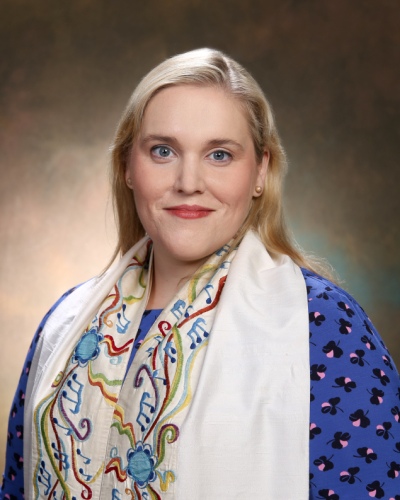This year, we will read the Torah portion Vayakheil-P’kudei on March 18th. In this parshah, men and women of special skill are called upon to craft objects for the Tabernacle. Those who weave or work with metals, among other skills, are entreated to use their talents to make magnificent the place in which God will dwell, the place where the people will worship. God singles out Bezalel and Oholiab, above all others, who God “endowed” with a “divine spirit of skill, ability, and knowledge in every kind of craft,” to oversee the project.
I often think about this text in my work with lay leaders at Temple Beth El and in our broader Charlotte Jewish community. Everything that we do as a synagogue happens because of the dedication of lay leaders: from the funding of TBE through My Temple Commitment, to welcoming constructive feedback, to those who give hours and hours of volunteer time govern or to bring key programs and practices of the synagogue to fruition. Each and every one of us have special skills that we can bring to our synagogue, the greater Jewish community, and the other circles that matter in our lives: work, school, or play. We organize. We email. We run errands. We greet. We advise. We have the skills to do it all. This Torah portion reminds me that we don’t all have to be Bezalel and Oholiab – able to oversee the project – but we certainly have the ability to make a contribution to the work.
This particular Shabbat is also called Shabbat Hachodesh and it is the Shabbat that either directly precedes or is the first Shabbat of the month of Nisan – the month of Passover.
The most amazing part of my Passover for the last nine years has been working with an incredible team of lay leaders to host The Porch’s Second Night Seder for Families with Young Children. These folks – moms, dads, and grandparents, and young adults who do not have kids – come together to create a dynamic and succinct telling of our story early enough in the evening that our littlest people can bear witness to our tale. Year after year, I have heard people in the community say that this seder is the single most impactful thing for Families with Young Children at TBE and I am so, so grateful to the creative and dedicated people who make it happen.
And there are the other seders: there’s the SPICE Seder, the Women’s Chocolate Seder, the Men’s Seder, our Community Second Night Seder, the Oasis Seder at the LJCC, the CJP seders, the seder in my house for which I actually have to cook. Each and every one of these seders are often packed to the gills, filled with people who want to share in the magic that is community built around food and history. Each and every one of these seders has a team of lay and professional leaders behind them, investing their special skills to make it meaningful and memorable to those who participate, not to mention to me. My cup truly overflows during Pesach here in Charlotte. We are very lucky to be a part of this special community.
At the end of the Torah portion, this incredible thing happens:
They took over from Moses all the gifts that the Israelites had brought, to carry out the tasks connected with the service of the sanctuary. But when these continued to bring freewill offerings to him morning after morning, all the artisans who were engaged in the tasks of the sanctuary came, each from the task upon which he was engaged, and said to Moses, “The people are bringing more than is needed for the tasks entailed in the work that the LORD has commanded to be done.” Moses thereupon had this proclamation made throughout the camp: “Let no man or woman make further effort toward gifts for the sanctuary!” So, the people stopped bringing: their efforts had been more than enough for all the tasks to be done. – Exodus 36:3-7
The people: the ones with highly specialized skills and talents, the ones who could lead and the ones who prefer to follow – brought more than enough to build God’s Tabernacle. Moses had to turn them away. He had to return their gifts. The people had brought more than enough.
When we give and when we receive, what would it mean if we were cognizant of what is enough and what is more than enough? I do not mean more than enough in a positive way, but so much so that the gift should not be given.
This Torah portion instructs us to give freely, but not too much – not too much that we burn out or sacrifice time needed in other areas of our lives – but enough that we have contributed as we are able.
Conversely, when we receive, what would it mean if we were not to take more than was necessary? We take what is appropriate for the occasion or for where we are in our own story.
As we approach this Passover season, when we sit with friends and family or among our synagogue communities at any of the seders, may the story of our people kindle within us a passion to give and to receive throughout our lives. May we give and receive with abundance, but not take or give out of proportion to what is healthy for us. May we give and receive freely, but never more than enough.




